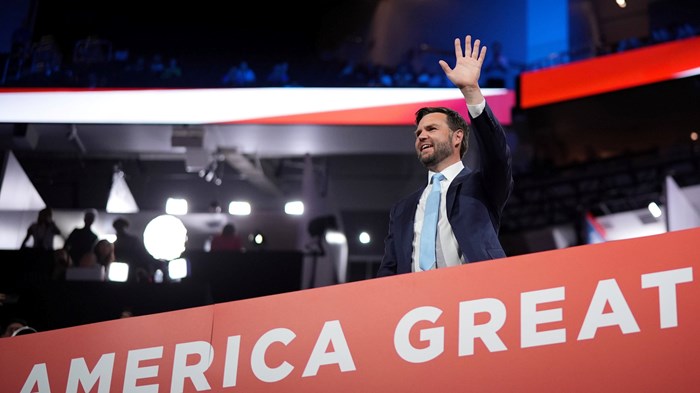
Donald Trump’s first running mate, Mike Pence, appealed to conservative evangelical voters by offering what Trump lacked: political experience, a pro-life record, a steady demeanor, and outspoken Christian faith.
Two presidential elections later, Trump’s 2024 pick for vice president, J. D. Vance, appeals to conservatives by being like the former president: a fellow political newcomer, a populist, and a fighter unafraid of shaking up the system.
He’s “somebody who can carry on the core of what President Trump did in his first administration for a while to come,” said Aaron Baer, president of Center for Christian Virtue, based in Vance’s home state of Ohio.
Vance rose to national prominence through his 2016 bestseller Hillbilly Elegy: A Memoir of a Family and Culture in Crisis, which drew attention to the lives and faith of working-class rural Americans.
Since then, he’s converted from evangelicalism to Roman Catholicism and from a Never Trump conservative to a faithful “Make America Great Again” Republican, successfully running for US Senate with Trump’s endorsement in 2022.
Political commentators are already talking about how a victory for the Republican ticket in November would put Vance in a strong position to contend for the nomination come 2028—under a national conservative or America First style of politics that comes as a departure from the old guard conservatism that someone like Pence represented.
“He appeals to the kind of younger, religious, political evangelical,” said author Hannah Anderson, who has written about rural life and ministry and reviewed Vance’s book for CT. “There’s a lot of questions of whether [the movement] will survive Trump, and if it’s going to survive, it’s going to be through someone like Vance.”
On the campaign trail, Vance regularly described himself as someone who will fight for Christian values.
“I just feel like people don’t actually have somebody that stands up and fights for them, that’s willing to speak loudly and powerfully on the issues that they care about,” he told the Christian Broadcasting Network. “They’re really worried, whether at their workplaces or on social media, can they actually speak their mind, can they actually speak about Christian values without being shut down?”
Vance’s selection as the Republican VP candidate has excited some evangelical voters, even if they have reservations about his recent moves away from a strict pro-life stance and about his opposition to providing aid to Ukraine in its fight with Russia.
Like Pence, he is at home speaking to culture-war issues or family values that resonate with social conservatives.
Baer had been skeptical of a big persona coming in and running for office in Ohio, but he felt more assured after talking with Vance during the campaign. “He understands what’s happening to families and happening to kids, as well as or better than political leaders, better than a lot of folks who lead pro-family organizations,” Baer said.
As the Republican Party shifts on abortion, Vance, like Trump, has deferred to the state’s role in determining abortion policy, acknowledged exceptional cases where abortion should be permitted, and supported access to the abortion medication mifepristone, The Hill reported.
“I will not be celebrating the pick of a newly self-professed pro abortifacient VP,” Jordan B. Cooper, a Lutheran pastor and podcast host, responded on Monday, calling Vance “a coward who gave up his pro-life principles when it benefited him.”
Baer said the move on abortion was concerning from an electoral enthusiasm point of view as well. Trump has “been very strong for us on the life issue,” he said. “But that’s the kind of thing that could lose pro-lifers and lose Christians that need to turn out to vote.”
Vance also lines up with the former president when it comes to one of the defining moments of Trump’s political career—the fight to overturn the 2020 election results.
“He still retains that kind of religiosity, but he’s ‘the fighting religious person’ whereas Pence was not going to fight in that way,” said Anderson. “Pence wasn’t going to take part in January 6. Vance would have.”
Vance has said as much himself: He’s stated that he would not have certified the 2020 election results, had he been in Pence’s place, on January 6, 2021, and instead said he would have pushed for the states to send multiple slates of electors.
After the attempted assassination of Trump on Saturday, Vance was also quick to blame Democrats for the shooting.
“The central premise of the Biden campaign is that President Donald Trump is an authoritarian fascist who must be stopped at all costs,” he wrote on X. “That rhetoric led directly to President Trump’s attempted assassination.”
So far, as a politician, the 39-year-old has carved out a reputation as being a young face of a conservative movement that embraces isolationism on the global stage, a protective trade policy over a free trade approach, and strict immigration and border policies. In the Senate, he’s been one of the most outspoken opponents to further financial aid to Ukraine, though that did not stop additional aid from clearing the chamber.
For a Republican politician, his targets are not always orthodox: On the Senate Banking Committee, he teamed up with Democrats like Sen. Elizabeth Warren of Massachusetts to go after big bank executives, though the effort also never passed.
At the time of his conversion in 2019, Vance had endorsed Catholic social teaching as his ideal for forming public policy, challenging the party to make social conservatism not just “about issues like abortion, but it has to have a broader vision of political economy, and the common good.”
His memoir detailed a fraught relationship with the church: Vance described his grandmother (and primary caregiver) as suspicious of organized religion, but she still taught him about Jesus and the Christian message. Vance had “an angry atheist phase,” but by the time he was leaving law school, he became reinterested in Christianity.
As an adult, he never committed to a particular Protestant denomination, as he explained in an interview for The American Conservative, but converted to Catholicism at St. Gertrude Priory in Cincinnati. If elected, he would be the second Catholic vice president—following the current Democratic president, Joe Biden.
“I became persuaded over time that Catholicism was true,” Vance said. “When I became more interested in faith, I started out with a clean slate, and looked at the church that appealed most to me intellectually. But it’s too easy to intellectualize this. When I looked at the people who meant the most to me, they were Catholic.”
Vance said in other interviews that his wife, Usha, who was raised Hindu, encouraged him to explore his Christian faith. Usha Vance is a corporate lawyer (who recently left her law firm) and is the daughter of Indian immigrants. The couple met at Yale Law School and married in 2014. They have three children.
Vance is a former Marine who went to Silicon Valley to work in biotechnology after law school. He also worked as a lawyer and venture capitalist in Washington, DC, before moving back to Ohio to mount his Senate campaign.
He beat out VP contenders such as South Carolina Sen. Tim Scott, North Dakota Gov. Doug Burgum, Florida Sen. Marco Rubio, House Republican conference chair Elise Stefanik, and Florida Gov. Ron DeSantis.
In Monday’s announcement, which came after Trump officially secured the GOP presidential nomination for the third time, the former president said Vance “will be strongly focused on the people he fought so brilliantly for”: “the American Workers and Farmers in Pennsylvania, Michigan, Wisconsin, Ohio, Minnesota, and far beyond.”
Five years ago, Vance criticized the way some evangelicals had embraced Trump as president. “But I also know that most of them aren’t doing it because they are sycophants,” he told Rod Dreher with The American Conservative. “They’re doing it because they don’t think they have a better option.”
In 2024, he’s challenged with convincing conservative voters that Trump is a good option—during a race when most Americans are dissatisfied with the names at the top of the ticket.
Vance seems to have little doubt of prevailing, however.
“What an honor it is to run alongside President Donald J. Trump. He delivered peace and prosperity once, and with your help, he’ll do it again,” he wrote in his first social media statement after the announcement was made. “Onward to victory!”

Support Our Work
Subscribe to CT for less than $4.25/month


















